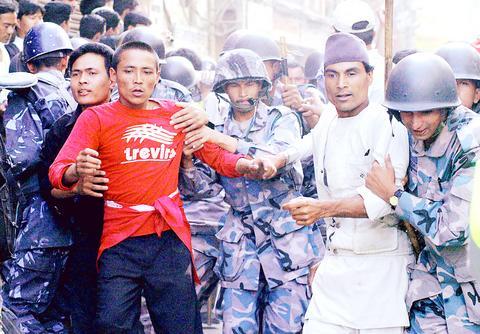With opposition to Nepal's monarchist government growing in intensity, more than 1,000 people were detained Friday in Katmandu, the capital, for violating a ban on public gatherings imposed this week. As many as 25,000 demonstrators defied the ban, according to news agency reports, capping a week of protests in favor of democracy.
Nepal has been embroiled in a civil war between Maoist rebels and the government that has left more than 9,500 dead, at least one-fourth of them since a ceasefire broke down at the end of August.
And it has been mired in a standoff between the five main opposition political parties and King Gyanendra that began when the king dismissed the elected prime minister and dissolved Parliament in October 2002.

PHOTO: EPA
Scheduled elections were postponed and efforts at rapprochement have failed.
Growing public frustration has led to the widespread expression of public sentiment against the king, who has historically been seen as a unifying force in Nepal. On April 4, the police injured more than 150 people when they used truncheons, rubber bullets and tear gas against protesters marching on the palace and chanting anti-monarchist slogans.
The king returned to Katmandu on Friday after a two-week tour of the country's western districts.
The Maoists, meanwhile, have stepped up their attacks on police posts and government centers in other areas of the country.
They have also been undertaking large-scale, if usually temporary, abductions of civilians to indoctrinate them.
Last weekend the Maoists also attacked Indian oil trucks after the Indian police arrested a senior Maoist leader in Kolkata, India.
The State Department warned American citizens this week against traveling to Nepal after two reports that American trekkers had been detained by the Maoists. The US is providing US$17 million in military aid to the government.

Tens of thousands of Filipino Catholics yesterday twirled white cloths and chanted “Viva, viva,” as a centuries-old statue of Jesus Christ was paraded through the streets of Manila in the nation’s biggest annual religious event. The day-long procession began before dawn, with barefoot volunteers pulling the heavy carriage through narrow streets where the devout waited in hopes of touching the icon, believed to hold miraculous powers. Thousands of police were deployed to manage crowds that officials believe could number in the millions by the time the statue reaches its home in central Manila’s Quiapo church around midnight. More than 800 people had sought

DENIAL: Pyongyang said a South Korean drone filmed unspecified areas in a North Korean border town, but Seoul said it did not operate drones on the dates it cited North Korea’s military accused South Korea of flying drones across the border between the nations this week, yesterday warning that the South would face consequences for its “unpardonable hysteria.” Seoul quickly denied the accusation, but the development is likely to further dim prospects for its efforts to restore ties with Pyongyang. North Korean forces used special electronic warfare assets on Sunday to bring down a South Korean drone flying over North Korea’s border town. The drone was equipped with two cameras that filmed unspecified areas, the General Staff of the North Korean People’s Army said in a statement. South Korea infiltrated another drone

COMMUNIST ALIGNMENT: To Lam wants to combine party chief and state presidency roles, with the decision resting on the election of 200 new party delegates next week Communist Party of Vietnam General Secretary To Lam is seeking to combine his party role with the state presidency, officials said, in a move that would align Vietnam’s political structure more closely to China’s, where President Xi Jinping (習近平) heads the party and state. Next week about 1,600 delegates are to gather in Hanoi to commence a week-long communist party congress, held every five years to select new leaders and set policy goals for the single-party state. Lam, 68, bade for both top positions at a party meeting last month, seeking initial party approval ahead of the congress, three people briefed by

Cambodia’s government on Wednesday said that it had arrested and extradited to China a tycoon who has been accused of running a huge online scam operation. The Cambodian Ministry of the Interior said that Prince Holding Group chairman Chen Zhi (陳志) and two other Chinese citizens were arrested and extradited on Tuesday at the request of Chinese authorities. Chen formerly had dual nationality, but his Cambodian citizenship was revoked last month, the ministry said. US prosecutors in October last year brought conspiracy charges against Chen, alleging that he had been the mastermind behind a multinational cyberfraud network, used his other businesses to launder